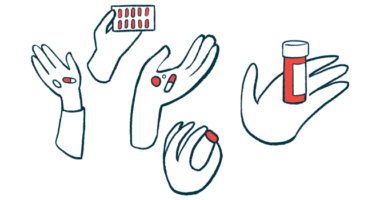Epidyolex may be safe, effective without clobazam: European study
Oral cannabidiol solution currently approved only as add-on therapy in Europe

Epidyolex may be safe and effective for people with Dravet syndrome and Lennox-Gastaut syndrome (LGS) without accompanying use of clobazam (brand names Onfi and Sympazan), according to a recent European analysis.
While the oral cannabidiol solution is cleared for use without clobazam in the U.S. — where it is marketed as Epidiolex — it is currently approved only to be used as an add-on therapy with clobazam in Europe.
“Our results support subgroup [clinical trial] analyses that demonstrated that add-on [Epidyolex] was effective in reducing seizures without clobazam,” in addition to being “sustainable and tolerable,” researchers wrote.
The study, “Retrospective chart review study of use of cannabidiol (CBD) independent of concomitant clobazam use in patients with Lennox-Gastaut syndrome or Dravet syndrome,” was published in Seizure: European Journal of Epilepsy.
It was funded by GW Pharmaceuticals, the company that developed Epidyolex and is now a part of Jazz Pharmaceuticals. Two study authors are employees at Jazz.
Epidyolex is highly purified oral solution of cannabidiol
Epidyolex is a highly purified oral solution of cannabidiol, the main non-psychoactive constituent of marijuana. Its use as an add-on therapy to standard anti-seizure medications for LGS and Dravet patients was shown to reduce seizure frequency in clinical trials.
While patients in these trials could be on any anti-seizure medications, the combination of clobazam and Epidyolex is of particular interest given findings that the medications interact, leading to increased concentrations of their metabolites in the bloodstream.
Upon review of clinical trial analyses in subgroups of patients using or not using clobazam, the European Medicines Agency (EMA) determined there was not enough evidence that Epidyolex was effective on its own.
Thus, it was cleared in Europe and the U.K. for use only in conjunction with clobazam for treating Dravet and LGS patients 2 and older. It’s also conditionally approved for tuberous sclerosis complex patients without clobazam in these regions.
In the U.S., it is approved, regardless of whether clobazam is also used, for children with Dravet, LGS, or tuberous sclerosis complex who are at least 1 year old.
Still, additional analyses conducted after the EMA decision have indicated that add-on Epidyolex can reduce seizures with or without clobazam, providing “the best current evidence of a [Epidyolex] effect without concomitant clobazam,” the researchers wrote.
Our results support subgroup [clinical trial] analyses that demonstrated that add-on [Epidyolex] was effective in reducing seizures without clobazam.
Real-world analysis of Epidyolex’s safety, efficacy when used without clobazam
To evaluate further, the researchers conducted a real-world analysis of the safety and efficacy of Epidyolex when used without clobazam among European patients who participated in an early access program (EAP) prior to the therapy’s EMA clearance, at which time clobazam use was not required.
The study enrolled 114 LGS and Dravet patients, 2 and older, at 19 European EAP sites between April 2021 and January 2022.
Among them, 107 patients with a mean age of 13.9 were treated for at least three months and comprised the population for the main analysis, including 92 with LGS (86%) and 15 with Dravet (14%).
The mean daily dose was 11.6 mg/kg in Dravet patients and 13.5 mg/kg in LGS patients. Most were also using other anti-seizure medications, the most common being valproate and topiramate for the Dravet patients.
In general, Dravet patients’ median monthly convulsive seizure frequency saw little change in the first year of treatment, but data varied significantly from patient to patient.
Three Dravet patients achieved a 50% reduction in seizure frequency after three months compared with the study’s start (baseline), and two had reached a 75% reduction. Among the eight patients who continued treatment for at least a year, one maintained at least a 50% or 75% reduction.
At the study’s start, the mean number of seizure-free days per month was 16.9 among Dravet patients, which was reduced by 1.5 days after three months and 3.8 days after a year.
For LGS patients, small reductions in median seizure frequency were observed after three months of treatment, with 30% achieving at least a 50% reduction in seizures after a year.
Of 114 participants, 16 stopped Epidyolex
Among all 114 initially enrolled participants, 64 stayed on Epidyolex without clobazam for at least a year. Clobazam was added to Epidyolex before the one-year mark for 23 people, whereas 16 stopped Epidyolex altogether.
For those 16 people, 12 stopped due to non-efficacy, three due to side effects, and one due to unreliable medication administration.
The most common side effects were drowsiness (31%), diarrhea (6%), decreased appetite (4%), seizures (3%), nausea (2%), and tooth fracture (2%). Four people with LGS experienced elevated liver enzymes.
The researchers noted that the wide variability in baseline seizures between patients overall “undoubtedly impacted” their findings, “especially given the small number of patients with [Dravet] enrolled in this study and the high proportion of missing documented data.”
The small number of Dravet patients could be attributed the fact that many would likely already have been using clobazam, and thus would not be eligible for inclusion in the analysis, the team noted.
Nevertheless, findings overall support the potential safety and effectiveness of Epidyolex for some patients not on clobazam.
The researchers noted that the study was conducted using Epidyolex, and the data are thus not generalizable to other cannabidiol-containing products.









